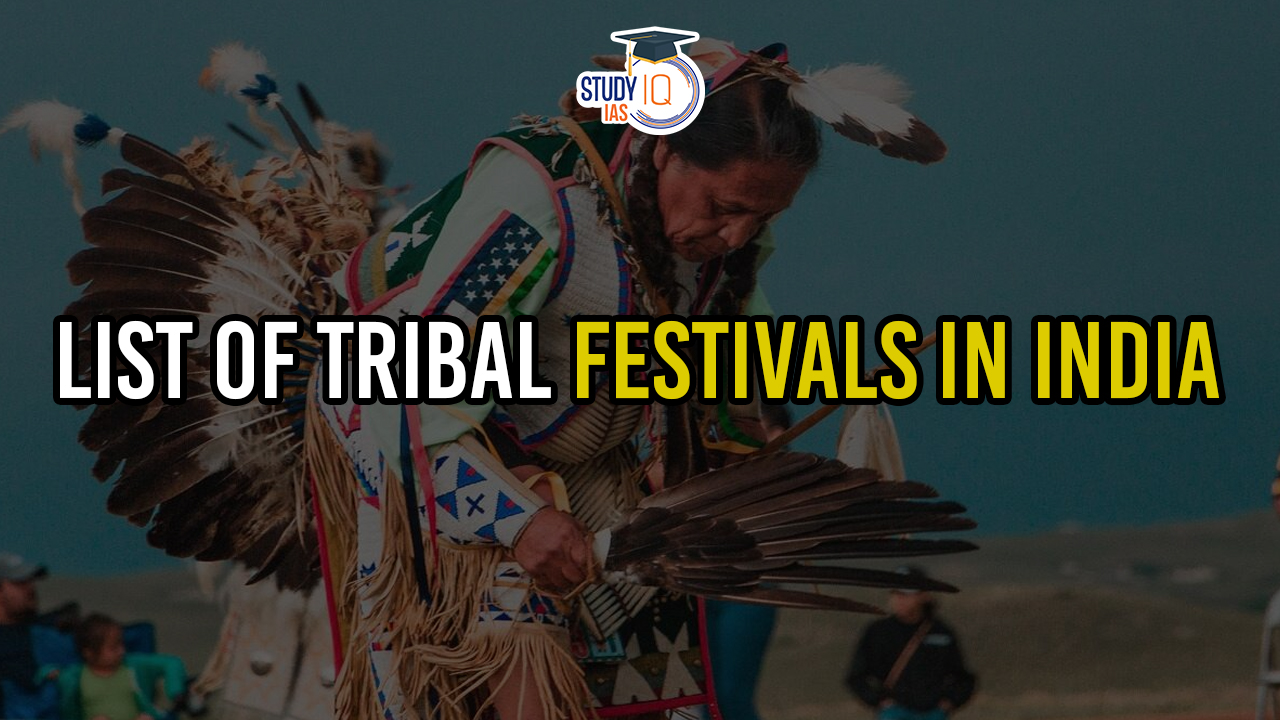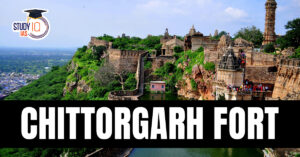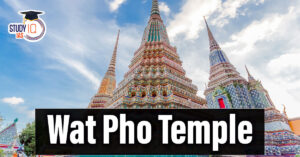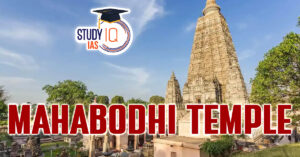Table of Contents
India, with its rich tapestry of cultures and traditions, is home to a plethora of tribal communities spread across the length and breadth of the country. These indigenous groups, with their unique customs, languages, and lifestyles, contribute to the vibrant mosaic of Indian culture. One of the most captivating aspects of tribal life is their festivals, which offer a glimpse into their rich cultural heritage and provide an opportunity for celebration, solidarity, and community bonding.
List Of Tribal Festivals In India
India, a land of diverse cultures and traditions, boasts a kaleidoscope of festivals celebrated with fervor and zeal throughout the year. Among these, the tribal festivals hold a special place, showcasing the indigenous heritage and vibrant customs of the country’s numerous tribal communities. From the northern state of Jammu and Kashmir to the southern tip of Kerala, from the western deserts of Gujarat to the eastern hills of Manipur, tribal festivals dot the landscape, each offering a unique glimpse into the rich tapestry of Indian tribal life.
Central India Tribal Festivals
In the heartland of Madhya Pradesh and Chhattisgarh, tribal festivals are a blend of tradition and celebration. Events like the Madai festival, Bhagoriya festival, and the tribal Dussehra of Bastar are marked by lively music, dance, and rituals that reflect the cultural ethos of the Gonds, Bhils, and other indigenous tribes. The beating of drums, melodious tunes of flutes, and the jingle of ghungroos create an atmosphere of joy and festivity.
| Festival Name | Location | Description |
|---|---|---|
| Madai Festival | Madhya Pradesh, Chhattisgarh | A vibrant festival celebrated primarily by the Gond tribe, marked by rituals, music, dance, and cultural performances. It is dedicated to the goddess Danteshwari and includes rituals to seek her blessings for prosperity and well-being. |
| Bhagoriya Festival | Madhya Pradesh | Bhagoriya is a unique festival celebrated by the Bhil and Bhilala tribes to mark the end of winter and the onset of spring. It is characterized by colorful fairs, traditional dance, music, and matchmaking, where young men and women choose their life partners. |
| Tribal Dussehra of Bastar | Chhattisgarh | This festival is a distinctive celebration of Dussehra by the tribal communities of Bastar. It lasts for over 75 days and involves elaborate rituals, traditional dance forms like Gedi and Muria, and the enactment of mythical stories associated with the festival. |
| Karma Festival | Madhya Pradesh, Chhattisgarh | Karma is an ancient tribal festival celebrated by the Oraon, Munda, and other tribes to worship their deity, Karma Devta. It involves rituals, prayers, and offerings to seek blessings for a good harvest, prosperity, and the well-being of the community. |
| Nagaji Festival | Madhya Pradesh | Nagaji festival is celebrated by the Bhil tribe in Madhya Pradesh, primarily in the Ratlam district. It is dedicated to Nagaji, a revered deity worshipped for protection from snake bites and for blessings related to agriculture, fertility, and overall well-being. |
Northern India Tribal Festivals
Nestled in the picturesque landscapes of Nagaland and Mizoram, tribal festivals abound, each offering a unique glimpse into the tribal way of life. From the Mim kut festival of the Kuki tribe to the renowned Hornbill festival celebrated by every Naga tribe, these events are marked by colorful rituals, traditional dances, and elaborate feasts. The vibrant costumes and intricate jewelry worn by the participants add to the spectacle, creating an unforgettable experience for visitors.
| Festival Name | Region | Description |
|---|---|---|
| Hornbill Festival | Nagaland | Celebrated by the Nagas, it showcases Naga culture, including traditional dances, music, and crafts. It’s held in December. |
| Chapchar Kut | Mizoram | A festival celebrated by the Mizos, marking the end of the traditional farming season. It includes traditional dances and music. |
| Baisakhi | Punjab | Also known as Vaisakhi, it marks the Sikh New Year and the harvest festival in Punjab. It’s celebrated with great enthusiasm and includes traditional dance, music, and processions. |
| Garia Puja | West Bengal | Celebrated by the tribal communities in West Bengal, it’s dedicated to the worship of the deity Garia. It involves rituals, dances, and feasting. |
| Kullu Dussehra | Himachal Pradesh | Celebrated in the Kullu Valley, it’s a week-long festival featuring processions of deities, cultural performances, and fairs. |
| Phool Dei | Uttarakhand | Celebrated in the Kumaon region of Uttarakhand, it marks the onset of spring. Young girls decorate their homes with flowers and sing traditional songs. |
| Sui Dhaaga | Rajasthan | A festival celebrated by the Bhil tribe of Rajasthan, it involves sewing a cloth with a needle and thread, symbolizing unity and harmony. |
| Tusu Parab | Jharkhand | Celebrated by the tribes of Jharkhand, particularly the Santhal community, it’s a harvest festival celebrated with traditional dances and songs. |
| Chhath Puja | Bihar | While not exclusively a tribal festival, it’s widely celebrated by tribal communities in Bihar. It’s dedicated to the worship of the Sun God and includes rituals performed near rivers or water bodies. |
Eastern India Tribal Festivals
In the eastern states of Jharkhand, Orissa, and Assam, tribal festivals are deeply rooted in age-old traditions and customs. The annual Mansa festival in Jharkhand sees devotees piercing their bodies as a form of appeasement to the goddess Manasa, while the Sarhul festival celebrated by the Mundas, Oraons, and Santhals is a joyous occasion marked by the offering of flowers and prayers for a bountiful harvest. In Orissa, festivals like Bali Jatra, Karama, and Mage Parab showcase the cultural diversity and rich heritage of the state’s tribal communities.
| Festival Name | Region | Description |
|---|---|---|
| Rath Yatra | Odisha | While not exclusively a tribal festival, it’s celebrated with great enthusiasm by tribal communities in Odisha. It involves the procession of deities on chariots, particularly in Puri. |
| Sohrai | Jharkhand | Celebrated by the Munda and Santhal tribes, Sohrai is a harvest festival marked by the worship of domestic animals, cultural performances, and traditional paintings on walls. |
| Tusu Parab | Jharkhand | As mentioned earlier, Tusu Parab is celebrated by the Santhal community in Jharkhand, particularly as a harvest festival with traditional songs and dances. |
| Karam Festival | Jharkhand, Odisha, Chhattisgarh | Celebrated by various tribal communities across eastern India, Karam Festival is dedicated to the deity Karam Rani, associated with agriculture and fertility. It involves rituals, dances, and offerings. |
| Nuakhai | Odisha, Chhattisgarh | Primarily celebrated by the people of western Odisha and parts of Chhattisgarh, Nuakhai is a harvest festival that involves offering the first produce of the season to the deities followed by feasting and cultural events. |
| Jhiri Mela | Jharkhand | Celebrated mainly by the Oraon tribe in Jharkhand, Jhiri Mela commemorates the martyrdom of freedom fighter Jatra Oraon. It includes cultural programs, fairs, and traditional sports. |
| Karma Puja | Jharkhand, Odisha, Chhattisgarh | A major festival among various tribal communities in eastern India, Karma Puja is dedicated to the deity Karma, associated with fertility and agriculture. It involves rituals, dances, and community feasting. |
| Durga Puja | West Bengal, Jharkhand, Odisha, Bihar | While Durga Puja is a widely celebrated Hindu festival, it’s also embraced by tribal communities in these regions, who participate in the festivities with their own cultural elements. |
| Sarhul | Jharkhand | Celebrated by the Oraon and Munda tribes, Sarhul marks the beginning of spring and the sowing season. It includes tree worship, traditional dances, and offerings to deities. |
Southern India Tribal Festivals
Down south, in Andhra Pradesh and the Lakshadweep Islands, tribal festivals exude vitality and charm. The Banjaras of Andhra Pradesh celebrate Holi with gusto, while the Samakka festival in Medaram brings together tribes from across the region to honor the Koya queen Samakka. In the Lakshadweep Islands, the Islamic festivals of Eid Ul Fitr, Bakr-Id, and Milad-Ul-Nabi take on a unique tribal flavor, reflecting the island’s diverse Muslim population.
| Festival Name | Region | Description |
|---|---|---|
| Bhadra Purnima | Karnataka | Celebrated by the Siddi community in Karnataka, Bhadra Purnima is a festival dedicated to the memory of the Sufi saint Baba Gor. It involves rituals, music, and dance. |
| Huttari | Karnataka | Celebrated by the Kodava community in Karnataka, Huttari is a harvest festival marked by offerings to deities, traditional dances like the ‘Kolata’ and ‘Ummattat,’ and feasting. |
| Onam | Kerala | While not exclusively a tribal festival, Onam is celebrated by various communities in Kerala, including some tribal groups. It’s a harvest festival featuring cultural performances, boat races, and elaborate feasts. |
| Pongal | Tamil Nadu | Similar to Onam, Pongal is a harvest festival celebrated by Tamil communities, including some tribal groups. It involves cooking traditional dishes, offering prayers to the Sun God, and cattle worship. |
| Bihu | Assam | While primarily celebrated by the Assamese people, Bihu is also embraced by some tribal communities in Assam, such as the Bodos. It’s a festival marking the Assamese New Year and the arrival of spring, featuring traditional dances and music. |
| Kolam | Tamil Nadu, Andhra Pradesh, Telangana | Kolam, also known as Kolattam or Kol, is a traditional dance form practiced by various communities, including some tribal groups in southern India. It’s often performed during festivals and special occasions. |
| Suggi | Karnataka | Celebrated by the Halakki Vokkaligas and other tribal communities in Karnataka, Suggi is a harvest festival involving rituals, cultural performances, and community feasting. |
| Rathajatra | Andhra Pradesh, Telangana | While Rathajatra is primarily associated with the Jagannath Temple in Puri, Odisha, it’s also celebrated in parts of Andhra Pradesh and Telangana by tribal communities, involving chariot processions and religious rituals. |
| Kambala | Karnataka | Kambala is a traditional buffalo race held in the coastal districts of Karnataka, particularly by the farming communities, including some tribal groups. It’s a significant cultural event and is often associated with religious rituals. |
Western India Tribal Festivals
In the desert state of Rajasthan, the Baneshwar fair of the Bhil tribe is a highlight of the tribal festival calendar. Held annually near the confluence of the Mahi, Som, and Jhakham rivers, the fair is a colorful extravaganza of music, dance, and traditional arts and crafts. Visitors can immerse themselves in the vibrant culture of the Bhil tribe, sampling local delicacies and experiencing the warm hospitality of the desert people.
| Festival Name | Region | Description |
|---|---|---|
| Bhagoria Haat | Madhya Pradesh | Celebrated by the Bhil and Bhilala tribes in Madhya Pradesh, Bhagoria Haat is a festival that marks the beginning of spring and the celebration of love. It includes traditional dances, music, and matchmaking rituals. |
| Bhagoria | Maharashtra | Similar to Bhagoria Haat in Madhya Pradesh, Bhagoria is celebrated by the Bhil tribe in Maharashtra. It’s a festival marked by music, dance, and social interactions, including elopements and marriages. |
| Pola | Maharashtra | Pola is a bull-worshipping festival celebrated by farmers, including tribal communities like the Kolis and Agaris, in Maharashtra. It involves decorating and parading bulls, offering prayers, and community festivities. |
| Navratri | Gujarat, Rajasthan, Maharashtra | While Navratri is widely celebrated by Hindus across India, it’s also embraced by tribal communities, particularly in Gujarat, Rajasthan, and Maharashtra, with their unique dance forms like Garba and Dandiya Raas. |
| Dussehra | Maharashtra, Gujarat, Rajasthan | Similar to Navratri, Dussehra is celebrated by various communities, including tribes in Maharashtra, Gujarat, and Rajasthan, with processions, effigy burning of Ravana, and cultural programs. |
| Teej | Rajasthan | Celebrated by various communities, including some tribal groups like the Garasia, Teej is a festival dedicated to the union of Lord Shiva and Goddess Parvati. It involves fasting, prayers, and traditional dances. |
| Gavari | Rajasthan | Celebrated by the Bhil tribe in Rajasthan, Gavari is a festival that lasts for about 40 days during the monsoon season. It involves rituals, dances, and reenactments of mythological stories. |
| Karam Festival | Rajasthan, Gujarat, Maharashtra | As mentioned earlier, Karam Festival is celebrated by various tribal communities across India, including those in western regions like Rajasthan, Gujarat, and Maharashtra, with rituals, dances, and offerings. |
| Holi | Rajasthan, Gujarat, Maharashtra | While Holi is a widely celebrated Hindu festival, it’s also embraced by tribal communities in western India, who participate in the festivities with their own cultural elements, including traditional dances and music. |
Tribal Festivals in India UPSC
Indian tribal festivals are a testament to the country’s rich cultural heritage and diversity. From the snow-capped peaks of the Himalayas to the sun-kissed shores of the Andaman Islands, tribal communities across India celebrate their traditions with passion and pride. These festivals not only offer a glimpse into the unique customs and rituals of indigenous tribes but also serve as a reminder of the importance of preserving and celebrating India’s rich cultural tapestry for generations to come.


 Chittorgarh Fort: Mining Ban within 10 k...
Chittorgarh Fort: Mining Ban within 10 k...
 PM Modi visits Wat Pho Temple in Bangkok
PM Modi visits Wat Pho Temple in Bangkok
 Mahabodhi Temple Complex at Bodh Gaya
Mahabodhi Temple Complex at Bodh Gaya





















